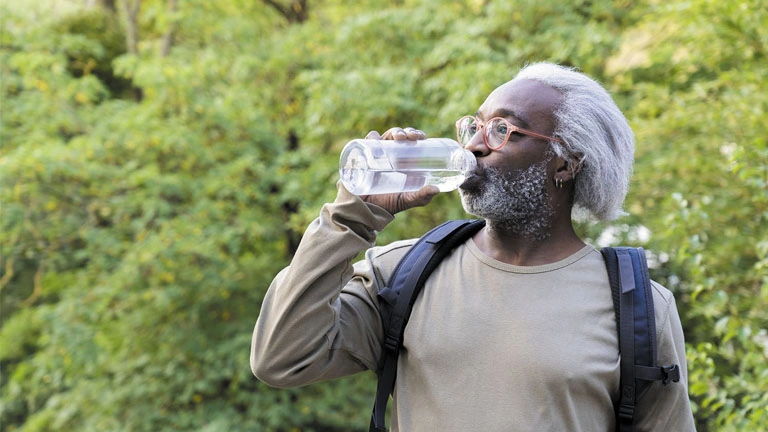The Fountain of Youth
Proper hydration is essential for optimal health, but many older adults still don't drink enough water.

When scientists search for life on other planets, they first look for the presence of water. After all, the laws of nature say that life as we know it needs water to exist and thrive.
Drinking water serves us earthlings in many ways. It helps deliver nutrients to cells, regulates body temperature and blood pressure, prevents infections, and keeps organs functioning correctly. It's probably no surprise, then, that adults who stay well hydrated appear to be healthier and develop fewer chronic conditions. Conversely, prolonged dehydration raises the risk of conditions like urinary tract infections, kidney stones, and constipation. Dehydration also can interfere with cognitive functions like attention and memory.
Are you dehydrated?
Even though water is the foundation of life, older adults have trouble drinking enough. "Part of the problem is that the sense of thirst diminishes with age, so many older adults can't always tell when they are dehydrated," says Dr. Qi Sun, associate professor in nutrition and epidemiology at Harvard's T.H. Chan School of Public Health. "And when they feel thirsty, odds are they are already dehydrated."
Signs of dehydration are fatigue, weakness, confusion, short-term memory loss, and increased irritability. One way to monitor hydration is by the color of your urine. When you're hydrated, your urine should be clear or a light straw color. A dark yellow or amber color is a sign to drink more water.
Watching the waterIt's possible to consume too much daily water in some health situations. These include problems with the thyroid, kidney, liver, or heart, or if you take medications that make you retain water, like nonsteroidal anti-inflammatory drugs, opiate pain medications, and some antidepressants. Others, like some blood pressure drugs and laxatives, can increase dehydration. If you are in any of these categories, check with your doctor to determine your daily water intake. |
Going to the well
The best way to prevent dehydration is to consume enough water daily. The National Academy of Medicine suggests that men drink about 10 cups of water, expecting they will get another 3 cups from water-containing foods. This amount is not necessarily a daily target but a general guideline. "Still, for the average person, it's a good number to aim for," says Dr. Sun.
There are times when you need extra water, like when you sweat from exercise or when you're exposed to hot weather. (A rule of thumb is to drink two to three cups of water per hour in these situations, or more if you're sweating heavily.) People also need extra water when they lose bodily fluids from vomiting or diarrhea.
Dr. Sun says that plain water is the best fluid to drink. Still, all beverages that contain water, like coffee and tea, contribute toward your daily needs. It's a myth that caffeinated versions of these beverages increase dehydration because they make you urinate more. (It's their water content and not the caffeine that makes you need to use the bathroom after drinking two or three cups.)
"Still, too much caffeine can give you jitters or keep you from sleeping, so you should monitor your intake if you are caffeine sensitive," says Dr. Sun.
Drinking unsweetened carbonated water is also acceptable, but avoid sweetened beverages, energy drinks, sports drinks, and "vitamin waters" as your primary fluid sources, as they can be high in sugar. Otherwise, here are some tips to stay hydrated:
Keep water handy. You are more likely to drink when you have water always within reach. Fill a 20-ounce water bottle four times daily and sip throughout the day.
Schedule regular drinking times. Set alarms on your phone or computer as a reminder to drink.
Drink when you eat. Drink a large glass of water with each meal and snack. Also drink room-temperature water. Research suggests that people drink the most water when it is served at room temperature.
Add some flavors. There are ways to make water more appealing. For example, perk up a pitcher of water with natural flavors like slices of citrus fruit (lemon, lime, orange, or grapefruit), ginger, cucumber, or crushed fresh mint. Another option is to add a splash of fruit juice to a glass of water.
Eat water-dense foods. Consuming foods with high water content also counts toward your daily amount. Examples include leafy green vegetables, cucumbers, bell peppers, celery, berries, and melons like watermelon and cantaloupe. These consist of about 90% water or even more. A general guideline is to count about half the serving as water. For example, one cup of watermelon contain about half a cup of water.
Disclaimers
The materials and content provided on LTCFEDS.gov, including Care Navigator services and other health insurance, healthcare, and medical information, are for educational purposes only and are general in nature, and not a substitute for professional health care. Nothing on LTCFEDS.gov should be construed as financial, healthcare, legal, or medical advice. The information provided is not intended to be a substitute for professional advice, diagnosis, or treatment. Always seek the advice of your physician or other qualified health provider with any questions you may have regarding medical treatment or health insurance or before making changes to your health care regimen.
